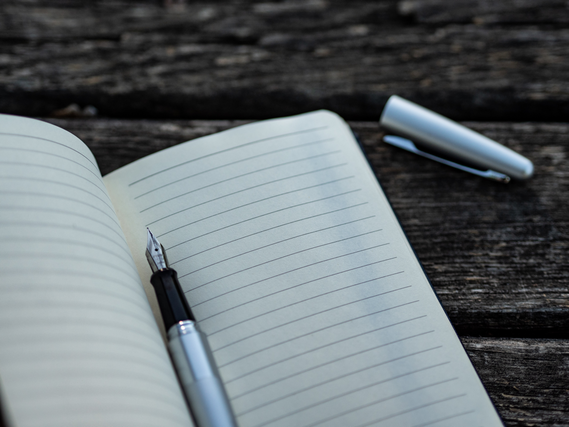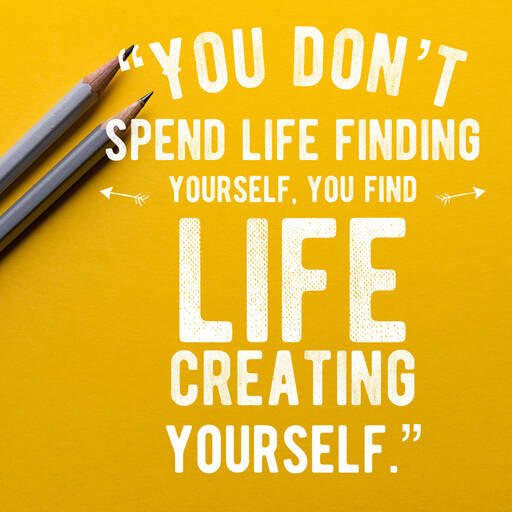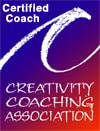What is your Creative Direction?It is in your soul as a creative person to make meaning in your life. You could go along with the normative milieu, status quo, and live a low maintenance life- but I’m going to bet that this is not you. Most creative people feel a deep drive to life authentically, meaningfully and purposefully. It is when they are living in this way they are truly happy and feel they are truly living. If you know this about yourself, Creative, this naturally begs the question, how will you make your meaning? What will be your purpose? What does your soul need this to be? Like the North Star of your creative soul, you need a purpose to be your creative direction, to guide the decisions you make in your life. One way to do this is to take the time to author your own creative life purpose statement. Writing a Creative Life Purpose StatementA creativity coach whose philosophy I greatly admire, Eric Maisel, in his book “Coaching the Artist Within,” (a read I also highly recommend), describes a process for generating a life purpose statement, which he states generally has six main elements: “- making use of your innate talents and abilities, your heart, mind and hands
Why Write a Creative Life Purpose Statement?In his book, Eric Maisel goes on to recommend creating a statement that incorporates these components into a single statement that will guide the decision making processes of your life. This is not easy and will take a lot of brain power to accomplish. You will need to write down your statement and likely revisit it often over a period of time to finalize it. When I wrote mine, I looked at it again a month after I had written my original statement, only to realize, the second component of what I thought was how I wanted to pilot the purpose in my life, was what I had defaulted to but not what to me was truly meaningful. This is in fact the reason you want to do this work. Writing a Creative Life Purpose Statement MindfullyYour statement may not include all six of these components but focus more deeply on a select few. Take the time to closely check in with your emotional needs and desires for your life as you think about your life purpose. What has brought you happiness? What has drained you of energy vs built you up? Are you feeling resistance towards any aspects of your desired life purpose (e.g. I “should” or “shouldn’t” include certain things?) This is all part of your process. Commit to your Creative Life Purpose StatementWhen you have finished your statement, you need to take the time to memorize it. To put it in a place of full recall, that you can spout off to anyone who asks you, at any time, anywhere. You want to be able to bring it to the front of your mind on demand when making any decision, big or small. After all, this is going to serve as your guiding light, keeping your life on course, pointed in the direction of your choosing. So go ahead, Creative, as I so often joke in the Creatively offices- stitch yours on a pillow. Creativity Counseling and Creativity Coaching for Help with your Creative Life Purpose StatementCreativity Coaching and Creativity Counseling are a great place to start if you are unsure of your creative priorities. One of the main reasons Creative People begin working with me is with this very question in mind. That is because having clarity here is very powerful! Once you know where you are going, the full powers of your Creative Personality are formidable in getting you there. If you would like to get started, I would love to help:
1) Book a Free Consultation. All new clients to Creatively, LLC are entitled to a 15 min, free consultation to sit with me and discuss your needs, services available, and we can problem solve and hand-pick best next steps to help you succeed. 2) Book a Coaching Package. Are you a working Creative in need of specific support? I offer a range of Coaching Packages- let's get started with one that is right for you. With love and wishing you clarity in finding your North Star, Cindy (c) 2022 Creatively, LLC www.creativelyllc.com Comments are closed.
|
get more from The Creativity CoursesLiking educational topics and knowing what's hot in creativity? Creatively has online courses, with an interactive creative community, coaching sessions and more in the Creativity Courses. Want these blogposts in a newsletter? Subscribe here, and get a free gift. Cindy Cisnerosis a Creativity Coach, Creative Therapist and Professional Artist in Sykesville, Maryland. She is an expert straddling the realms of arts, creativity research, psychology, therapy, and coaching. She provides Online Creativity Counseling in Maryland and Virginia, and Online Creativity Coaching throughout the USA, Canada and the UK tailored for the discerning, imaginative, artistic, and neurodiverse. The information provided in this blog is from my own clinical experiences and training. It is intended to supplement your clinical care. Never make major life changes before consulting with your treatment team. If you are unsure of your safety or wellbeing, do not hesitate to get help immediately.
Archives
July 2024
|
|
Concierge Therapy for Creatives in Maryland
Creativity Coaching Worldwide including the USA, UK and Canada |
Telephone |
|



 RSS Feed
RSS Feed

